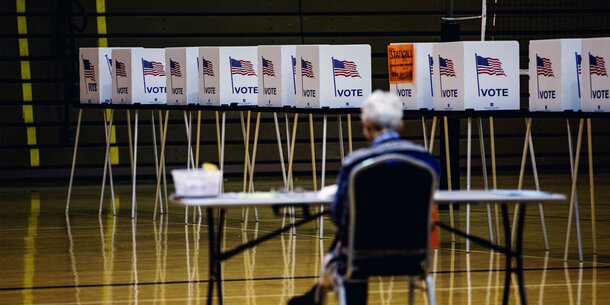Voting in Texas has never been easy. Even before the Texas Legislature passed S.B. 1, Texas was among the states that make it hardest for voters to register and vote, with some of the most onerous voting restrictions in the country.
But on August 31, the Texas legislature made it even harder to vote by passing S.B. 1, an omnibus voter suppression bill. S.B. 1’s “anti-solicitation” provision makes it a state jail felony for public officials and election officials to solicit mail ballot applications from voters who are eligible or may be eligible to vote by mail. It also makes election officials liable for civil penalties for any violation of the election code, including the anti-solicitation provision.
On December 10, the Brennan Center and the Harris County Attorney’s Office filed a complaint in the U.S. District Court for the Western District of Texas against Texas Attorney General Ken Paxton, challenging S.B. 1’s anti-solicitation provision under the U.S. Constitution. For more information about the Brennan Center’s lawsuit challenging other provisions of S.B. 1, LUPE v. Abbott, click here.
We represent Harris County Elections Administrator Isabel Longoria and Cathy Morgan, a volunteer deputy registrar. Plaintiffs assert that S.B. 1’s anti-solicitation provision violates the First and Fourteenth Amendments because it criminalizes constitutionally protected speech.
Plaintiffs are also represented by Weil, Gotshal & Manges LLP. Longoria is also represented by the Harris County Attorney’s Office.
On December 27, plaintiffs filed an amended complaint naming the local district attorneys of Harris County, Williamson County, and Travis County, as well as the State Attorney General, as defendants in the lawsuit. And on December 28, Plaintiffs filed for a preliminary injunction, requesting the court to enjoin S.B. 1’s anti-solicitation provision no later than February 14, 2022. Plaintiffs sought this quick relief to ensure that Texas voters can meet the deadline of February 18, 2022, to request a mail ballot application for the March 1, 2022 primary election. Following a hearing on February 11, 2022, the Court granted plaintiffs’ motion for a preliminary injunction, barring the defendants from enforcing the anti-solicitation provision against them during the lawsuit.
The Attorney General and Williamson County district attorney appealed portions of the preliminary injunction to the Fifth Circuit Court of Appeals. Oral argument took place on March 8, 2022. The Fifth Circuit temporarily stayed the appealed portions of the preliminary injunction during the appeal, but the portions of the preliminary injunction protecting Longoria from criminal prosecution and Morgan from criminal prosecution in Travis County remained in effect.
On March 21, 2022, the Fifth Circuit asked the Texas Supreme Court to interpret the meaning of S.B. 1’s anti-solicitation provision as a matter of Texas law. Oral argument occurred before the Texas Supreme Court on May 11, 2022. The Supreme Court determined on June 10, 2022, that Morgan was not a “public official” under S.B. 1 but declined to say whether other volunteer deputy registrars are public officials under the statute. Additionally, the Court held that the Attorney General could not enforce the civil penalties provision in S.B. 1 against Longoria but did not rule on whether the Attorney General has any authority to enforce that provision.
Following the Texas Supreme Court’s ruling, the Fifth Circuit vacated the challenged portions of the injunction and returned the case to the District Court with instructions to dismiss. As to Morgan, the Court found that she lacked standing to sue the Williamson County district attorney because she is not a public official and therefore not subject to prosecution under the anti-solicitation provision. The Court also held that Longoria’s claims against the Attorney General were barred by sovereign immunity because the Attorney General could not enforce the civil penalties provision against her. On June 28, 2022, the District Court granted the Attorney General’s and Williamson County district attorney’s motions to dismiss as to the appealed portions of the injunction. On July 1, 2022, plaintiffs dismissed their remaining claims.
Documents
District Court
- Complaint (December 10, 2021)
- Amended Complaint (December 27, 2021)
- Motion for Preliminary Injunction (December 28, 2021)
- Defendant-Appellant Attorney General Paxton’s Motion to Stay (January 4, 2022)
- Plaintiffs Response in Opposition to Attorney General Paxton’s Motion to Stay (January 10, 2022)
- Defendant Attorney General Paxton’s Motion to Dismiss or Abstain (January 24, 2022)
- Defendant District Attorney Dick’s Motion to Dismiss (January 27, 2022)
- Defendant District Attorney Dick’s Response in Opposition to Plaintiffs’ Motion for Preliminary Injunction (February 8, 2022)
- Defendant Attorney General Paxton’s Response to Plaintiffs’ Motion for a Preliminary Injunction (February 8, 2022)
- Plaintiffs’ Reply in Support of Motion for Preliminary Injunction (February 10, 2022)
- Order Granting Preliminary Injunction (February 11, 2022)
- Plaintiffs’ Response in Opposition to Defendant Attorney General Paxton’s Motion to Dismiss or Abstain and Defendant District Attorney Dick’s Motion to Dismiss (February 23, 2022)
- Defendant District Attorney Dick’s Reply to Plaintiffs’ Response in Opposition to Dick’s Motion to Dismiss (March 2, 2022)
- Defendant Attorney General Paxton’s Reply in Support of Motion to Dismiss or Abstain (March 2, 2022)
- Order Granting Motion to Dismiss without prejudice (June 28, 2022)
- Plaintiffs’ Notice of Dismissal of Complaint (July 1, 2022)
Circuit Court
- Defendant-Appellant Attorney General Paxton’s Motion to Stay (February 16, 2022)
- Plaintiffs-Appellees’ Opposition to Motion to Stay (February 17, 2022)
- Fifth Circuit Order on Motion to Stay (February 17, 2022)
- Defendant-Appellant Attorney General Paxton’s Brief (February 23, 2022)
- Defendant-Appellant District Attorney Dick’s Brief (February 23, 2022)
- Plaintiffs-Appellees’ Brief (February 28, 2022)
- Defendant-Appellant Attorney General Paxton Reply Brief (March 2, 2022)
- Defendant-Appellant District Attorney Dick’s Reply Brief (March 2, 2022)
- Opinion Certifying Questions to Texas Supreme Court (March 21, 2022)
- Defendant-Appellant District Attorney Dick’s Motion for Remand with Instructions to Dismiss for Lack of Subject Matter Jurisdiction (May 23, 2022)
- Plaintiff-Appellee Cathy Morgan’s Opposition to Defendant-Appellant District Attorney Dick’s Motion to Dismiss (June 2, 2022)
- Fifth Circuit Unpublished Opinion (June 21, 2022)
Supreme Court
- Notice of Certified Questions (March 21, 2022)
- Defendant-Appellant Attorney General Paxton’s Brief (April 8, 2022)
- Defendant-Appellant District Attorney Dick’s Brief (April 8, 2022)
- Plaintiffs-Appellees’ Response Brief (April 22, 2022)
- Defendant-Appellant Attorney General Paxton’s Reply Brief (April 27, 2022)
- Defendant-Appellant District Attorney Dick’s Reply Brief (April 27, 2022)
- Supreme Court of Texas Opinion (June 10, 2022)

